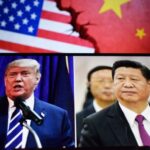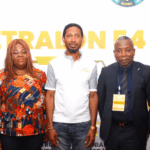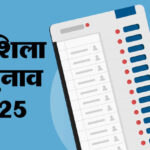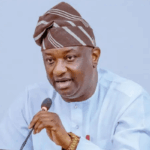President Bola Tinubu is taking no prisoners. He and his party, the All Progressives Congress, APC, are making every effort to woo governors from opposition parties into their fold ahead of the 2027 presidential election. Recently, Governor Peter Mbah of Enugu State defected from the Peoples Democratic Party, PDP, to join APC and donned Tinubu's trademark cap, which is now a test of loyalty. Governor Douay Diri of Bayelsa State has also left the PDP and appears to be moving to the APC. The Minister of Information, Mohammed Idris, claimed that the APC will control 30 states by 2026, six states shy of the 36 states in the country. The minister later declined to say, but the truth is that Tinubu is determined to capture the political space and has most of the opposition governors in his party, or at least, like Anambra State Governor Charles Soludo, owing allegiance to him.
Also read: Storm of defection and situation of voters
But why is President Tinubu like a bandit targeting governors of the other party when he should be focusing on tackling the dire poverty and misery in Nigeria? Well, the answer is twofold. Firstly, since the day he was sworn in on May 29, 2023, Tinubu has been clinging to his re-election bid in 2027. Every political move, every political alliance, like that of Nyesom Wike, former Rivers State Governor and now Minister of the Federal Capital Territory, Abuja, has been with 2027 in mind. Someone recently described Tinubu as a transactional president who sees politics as a give-and-take deal. Wooing opposition governors through pressure and inducements is certainly a give-and-take arrangement with an eye on electoral fortunes.
The second answer is the reason for this interference, and it rests on the assumption that state governors determine the outcome of presidential elections in Nigeria. Of course, given the ability of state governors to manipulate elections in their states, that notion is difficult to dismiss. As local kingpins who sit at the top of the political food chain in their respective states, governors can often influence election outcomes through patronage politics and rampant rigging. One need only consider how in any local government election, almost all chairperson and councilor posts are won by the party of the sitting state governor.
“Voters are not really free to vote, to choose the leaders of their choice because of vote-buying, rigging, violence and all the other malpractices and irregularities associated with elections in Nigeria.”
Take Rivers State. Last year, the state held a local government election under Governor Siminalai Fubara before President Tinubu was suspended from office. In that election, Fubara's sponsored party, the Action People's Party, APP, won 22 of the 23 local government areas in the state. But fast forward to this year. Another local government election was held, this time under Vice Admiral Ibok-Ete Ibas (rtd), the sole administrator appointed by President Tinubu to run the state. the outcome? Well, the APC, which was insignificant in the 2024 election, won 20 out of the 23 LGAs. Then what happened in just one year? Are Rivers people so fickle in their political affiliations? no way. The truth is that there was a new “governor” in charge, and he ensured that the entire electoral process was completely compromised, from voter registration to voting and tallying of results.
But true democracy doesn't work like this. In a true democracy, power belongs to the people, and state governors do not have widespread influence in elections. The 1999 Constitution describes Nigeria as a republic. But a republic is a state in which the supreme power rests with the people, where elected representatives receive their offices by the will and consent of the governed, voluntarily expressed in free and fair elections.
Sadly, this is not the case in Nigeria. Due to vote buying, rigging, violence and all the other malpractices and irregularities associated with elections in Nigeria, voters are not really free to vote as they wish, to elect leaders of their choice. The result is that Nigeria has governors who are products of election rigging or who have been made judges. And, of course, when governors who lack real legitimacy come to power, they become extremely powerful. Yet political power must be exercised with genuine legitimacy, otherwise democracy will become a sham.
But many governors in Nigeria exercise power without real legitimacy. Take the two governors who defected from the PDP, Diri and Mbah.
How did they come to power? Well, in the case of Diri, through the perverse adjudication of elections. The candidate who won the governorship election in Bayelsa State in 2019 was David Lyon of the APC, but he was sacked by the Supreme Court because his deputy submitted forged certificates to INEC. Instead of ordering fresh elections, the apex court gave the post of governor to Diri, who was not the people's choice? What about MBH? He won a highly controversial election in 2023, in which, according to INEC, he reportedly won 44.9 percent of the vote against his nearest rival's 44 percent. Yet, despite their questionable legalities, once in power, Diri and Mbah became so powerful that Tinubu now views them as crucial to his re-election in 2027.
In their book, Nigeria: What Everyone Needs to Know, John Campbell and Matthew Page state that “Nigerian state governors are more powerful than their American counterparts, putting presidents in power.” Of course, they are right. No American governor is powerful enough to vote an unpopular presidential candidate to power. For example, in the 2024 presidential election, all swing states like Michigan, Wisconsin, and Pennsylvania, which Donald Trump won to secure a second consecutive term, were controlled by Democratic governors. Yet, those governors could not help their party's candidate Kamala Harris win their state and thus the presidency.
ALSO READ: ADC says no defection will save APC in 2027
Why? Well, because when it comes to choosing president, Americans vote based on their perception of the candidate, their preferences, and their party affiliation. They do not follow the orders of the Governor. But in Nigeria, a society steeped in corruption and clientelism, governors can easily use their patronage power to influence voters, barring the rigging that characterizes Nigerian elections.
But all the above shows the extent of the influence of state governors in the 2023 presidential elections in Nigeria. Labor Party presidential candidate Peter Obi won in eleven states and Abuja without the support of a single state governor. All states won by Obi were controlled by governors from other parties, but, like governors of American swing states, they could not deliver their states to their parties' presidential candidates. In fact, even the governor of Tinubu's home state, Lagos State, could not give the state to his leader because Obi had won it. That was the power of the people in action. Something similar happened in France in 2016 when Emmanuel Macron, a junior minister in the government of President François Hollande, formed a new party, En Marche, and defeated the established parties and their well-known candidates in the presidential election. This is called people power!
There must indeed come a time in Nigeria when the power of the people trumps the arrogance and excessive influence of state governors in presidential elections, when a presidential candidate can only win by winning the hearts and minds of the people and not by making sordid quid-me deals with state governors. The truth is that defecting PDP governors need the federal power of the APC to guarantee victory in their next elections or a soft landing after leaving office, while the APC needs the governors to do the odious task of “handing over” their states to President Tinubu in 2027. But Nigeria must reject the extractive politics of transactionism and embrace the true spirit of representative democracy and republicanism, where power truly belongs to the people.











